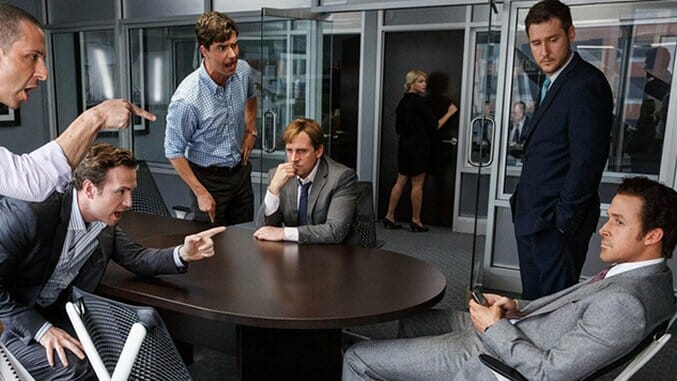The Big Short

“In a mad world, only the mad are sane.”
This quote—most often associated with Ran, director Akira Kurosawa’s King Lear adaptation—carries a profound amount of resonance when viewing The Big Short. Based on the 2010 nonfiction book by Michael Lewis, Adam McKay’s latest film offers a kaleidoscopic look into the months leading up to the 2007 financial meltdown, following the perspective of several key Wall Street players who saw the crash coming and decided, in a move considered by everyone else to be nothing short of clinical insanity, to bet against the banks.
The Big Short is an angry film. And rightfully so—the amount of callous thievery characters uncover here is enough to make any rational person’s blood boil. It’s also, unquestionably, a funny film, tempering its acerbic leanings by highlighting just how blatantly surreal the whole ordeal truly was. The comedy serves as the sugar that helps the abrasive medicine go down.
Our initial guide into this world comes in the form of bank trader, Jared Vennett (played, to smarmy perfection, by Ryan Gosling). After a phone mishap puts him in touch with temperamental money manager Mark Baum (Steve Carell), the two form an unlikely (and contentious) partnership wherein Jared offers inside information as Baum’s team begins exploring claims that the housing market is set to collapse at any moment. Elsewhere, two wannabe Wall Street upstarts, Jamie Shipley and Charlie Geller (Finn Wittrock and John Magaro, respectively) accidently stumble upon the same conclusion. When their attempt to report the oncoming storm falls on deaf ears, the duo recruits retired trader Ben Rickert (a surprisingly understated Brad Pitt) to help them game the system.
Fleshing out this cast is Michael Burry (Christian Bale), an eccentric hedge fund manager with Asperger’s who discovers the banks’ deception after reading hundreds of relevant spreadsheets. Bucking orders from both his superiors and clients, Burry proceeds to invest the fund’s money in favor of the banks failing.
-

-

-

-

-

-

-

-

-

-

-

-

-

-

-

-

-

-

-

-

-

-

-

-

-

-

-

-

-

-

-

-

-

-

-

-

-

-

-

-








































